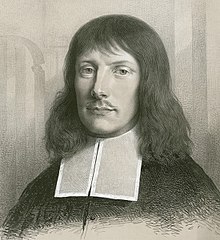Lobe den Herren, den mächtigen König der Ehren, BWV 137
|
Lobe den Herren, den mächtigen König der Ehren BWV 137 |
|
|---|---|
| Chorale cantata by J. S. Bach | |

Joachim Neander, the author of the hymn text
|
|
| Occasion | Twelfth Sunday after Trinity |
| Performed | 19 August 1725: Leipzig |
| Movements | 5 |
| Chorale | "Lobe den Herren, den mächtigen König der Ehren by Joachim Neander |
| Vocal | SATB choir and solo |
| Instrumental |
|
Lobe den Herren, den mächtigen König der Ehren (Praise the Lord, the mighty King of honor),BWV 137, is a church cantata by Johann Sebastian Bach. He composed the chorale cantata in Leipzig for the twelfth Sunday after Trinity and first performed it on 19 August 1725. It is based on the hymn by Joachim Neander (1680).
Bach composed the cantata for the Twelfth Sunday after Trinity. It forms part of a cycle of chorale cantatas which Bach composed in Leipzig over a period of two years 1724–25. In 1724, his second year in the city, Bach had composed chorale cantatas between the first Sunday after Trinity of 1724 and Palm Sunday, but for Easter had returned to cantatas on more varied texts, possibly because he lost his librettist. Later Bach composed again chorale cantatas to complete his second annual cycle. This cantata is one of the completing works. It is based entirely on the unchanged words on the hymn "Lobe den Herren, den mächtigen König der Ehren" (1680) by Joachim Neander.
The prescribed readings for the Sunday were from the Second Epistle to the Corinthians, the ministry of the Spirit (), and from the Gospel of Mark, the healing of a deaf mute man (). Unlike most chorale cantatas of the second cycle, but similar to the early Christ lag in Todes Banden, BWV 4, Bach left the chorale text unchanged, thus without a reference to the readings.
...
Wikipedia
